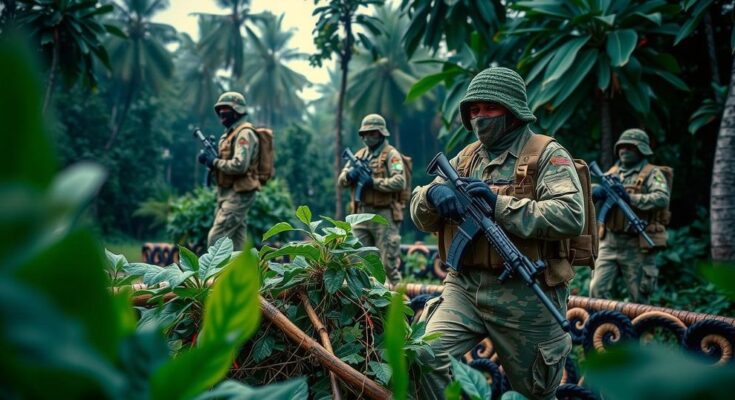The Congolese government has accused the Rwanda-backed M23 rebel group of ethnic cleansing in eastern Congo, citing violent expulsions of locals. Although a July ceasefire reduced direct fighting, clashes continue. With over seven million displaced, the humanitarian crisis persists amid allegations against Rwanda for supporting the rebels and engaging in war crimes.
The government of the Democratic Republic of the Congo has accused the M23 rebel group, allegedly supported by Rwanda, of committing acts of “ethnic cleansing” in the eastern provinces of Rutshuru and Masisi. Interior Minister Jacquemain Shabani stated that there has been a significant influx of foreign populations into these territories, where local residents have reportedly been forced to flee due to violence. Shabani emphasized that the expulsion of locals constitutes ethnic cleansing. This allegation surfaced following the M23’s recent announcement of appointed administrators in the territories they claim to control. Eastern Congo has been a hotspot for over 100 armed groups vying for control, particularly over its mineral-rich resources, leading to a humanitarian catastrophe with over seven million people displaced, many lacking access to essential aid. The M23, primarily composed of ethnic Tutsis, emerged from the Congolese army over a decade ago and gained notoriety in 2012 after seizing the city of Goma. Congo has further accused Rwanda of involvement in war crimes within its territories, with U.S. and U.N. experts asserting that Rwanda provides military support to the M23. Although Rwanda disputes these allegations, it acknowledged in February the presence of its troops in eastern Congo as part of its security strategy, due to rising tensions involving Congolese forces along the border. U.N. estimates suggest that as many as 4,000 Rwandan soldiers could be operating within Congo. A ceasefire brokered in July by the United States and Angola diminished direct confrontations between Rwandan and Congolese forces, yet violence persists between M23 and various pro-government militia factions. In August, armed conflict resulted in the deaths of 16 villagers, signaling violations of the truce that was intended to alleviate the suffering of the displaced population.
The conflict in eastern Congo has been characterized by a proliferation of armed groups, driven largely by competition for the region’s abundant mineral resources. The M23 rebel group, formed in 2012, has been a significant player in this conflict, with known ties to Rwanda. This ongoing instability has led to a severe humanitarian crisis, as millions are displaced and vulnerable to violence. The accusations of ethnic cleansing reflect deeper issues surrounding ethnic tensions, control of territory, and external influences, particularly from neighboring Rwanda.
In summary, the allegations of ethnic cleansing leveled by the Congolese government against the M23 rebel group underscore the ongoing humanitarian and security crisis in eastern Congo. With the involvement of foreign troops and the resurgence of conflict despite ceasefires, the situation remains precarious. Addressing these complex dynamics is essential for restoring peace and stability in the region.
Original Source: apnews.com




